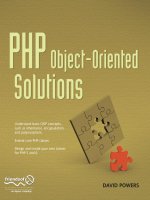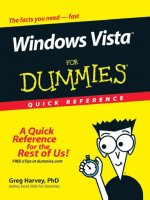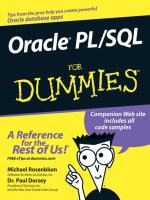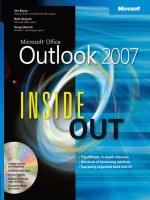Tài liệu Oracle PL/SQL For Dummies P1 doc
Bạn đang xem bản rút gọn của tài liệu. Xem và tải ngay bản đầy đủ của tài liệu tại đây (649.23 KB, 30 trang )
by Michael Rosenblum and Dr. Paul Dorsey
Oracle
®
PL/SQL
FOR
DUMmIES
‰
01_599577 ffirs.qxp 5/1/06 12:08 PM Page i
01_599577 ffirs.qxp 5/1/06 12:08 PM Page iv
by Michael Rosenblum and Dr. Paul Dorsey
Oracle
®
PL/SQL
FOR
DUMmIES
‰
01_599577 ffirs.qxp 5/1/06 12:08 PM Page i
Oracle
®
PL/SQL For Dummies
®
Published by
Wiley Publishing, Inc.
111 River Street
Hoboken, NJ 07030-5774
www.wiley.com
Copyright © 2006 by Wiley Publishing, Inc., Indianapolis, Indiana
Published by Wiley Publishing, Inc., Indianapolis, Indiana
Published simultaneously in Canada
No part of this publication may be reproduced, stored in a retrieval system or transmitted in any form or
by any means, electronic, mechanical, photocopying, recording, scanning or otherwise, except as permit-
ted under Sections 107 or 108 of the 1976 United States Copyright Act, without either the prior written
permission of the Publisher, or authorization through payment of the appropriate per-copy fee to the
Copyright Clearance Center, 222 Rosewood Drive, Danvers, MA 01923, (978) 750-8400, fax (978) 646-8600.
Requests to the Publisher for permission should be addressed to the Legal Department, Wiley Publishing,
Inc., 10475 Crosspoint Blvd., Indianapolis, IN 46256, (317) 572-3447, fax (317) 572-4355, or online at
/>.
Trademarks: Wiley, the Wiley Publishing logo, For Dummies, the Dummies Man logo, A Reference for the
Rest of Us!, The Dummies Way, Dummies Daily, The Fun and Easy Way, Dummies.com, and related trade
dress are trademarks or registered trademarks of John Wiley & Sons, Inc. and/or its affiliates in the United
States and other countries, and may not be used without written permission. Oracle is a registered trade-
mark of Oracle Corporation. All other trademarks are the property of their respective owners. Wiley
Publishing, Inc., is not associated with any product or vendor mentioned in this book.
LIMIT OF LIABILITY/DISCLAIMER OF WARRANTY: THE PUBLISHER AND THE AUTHOR MAKE NO REP-
RESENTATIONS OR WARRANTIES WITH RESPECT TO THE ACCURACY OR COMPLETENESS OF THE CON-
TENTS OF THIS WORK AND SPECIFICALLY DISCLAIM ALL WARRANTIES, INCLUDING WITHOUT
LIMITATION WARRANTIES OF FITNESS FOR A PARTICULAR PURPOSE. NO WARRANTY MAY BE CRE-
ATED OR EXTENDED BY SALES OR PROMOTIONAL MATERIALS. THE ADVICE AND STRATEGIES CON-
TAINED HEREIN MAY NOT BE SUITABLE FOR EVERY SITUATION. THIS WORK IS SOLD WITH THE
UNDERSTANDING THAT THE PUBLISHER IS NOT ENGAGED IN RENDERING LEGAL, ACCOUNTING, OR
OTHER PROFESSIONAL SERVICES. IF PROFESSIONAL ASSISTANCE IS REQUIRED, THE SERVICES OF A
COMPETENT PROFESSIONAL PERSON SHOULD BE SOUGHT. NEITHER THE PUBLISHER NOR THE
AUTHOR SHALL BE LIABLE FOR DAMAGES ARISING HEREFROM. THE FACT THAT AN ORGANIZATION
OR WEBSITE IS REFERRED TO IN THIS WORK AS A CITATION AND/OR A POTENTIAL SOURCE OF FUR-
THER INFORMATION DOES NOT MEAN THAT THE AUTHOR OR THE PUBLISHER ENDORSES THE INFOR-
MATION THE ORGANIZATION OR WEBSITE MAY PROVIDE OR RECOMMENDATIONS IT MAY MAKE.
FURTHER, READERS SHOULD BE AWARE THAT INTERNET WEBSITES LISTED IN THIS WORK MAY HAVE
CHANGED OR DISAPPEARED BETWEEN WHEN THIS WORK WAS WRITTEN AND WHEN IT IS READ.
For general information on our other products and services, please contact our Customer Care
Department within the U.S. at 800-762-2974, outside the U.S. at 317-572-3993, or fax 317-572-4002.
For technical support, please visit
www.wiley.com/techsupport
.
Wiley also publishes its books in a variety of electronic formats. Some content that appears in print may
not be available in electronic books.
Library of Congress Control Number: 2006922426
ISBN-13: 978-0-7645-9957-6
ISBN-10: 0-7645-9957-7
Manufactured in the United States of America
10 9 8 7 6 5 4 3 2 1
1O/RX/QV/QW/IN
01_599577 ffirs.qxp 5/1/06 12:08 PM Page ii
About the Authors
Michael Rosenblum is originally from Kremenchuk, Ukraine. In 2000, he moved
to the United States, where he lives with his family in Edison, New Jersey. He
works as a Development DBA at Dulcian, Inc. Michael is responsible for system
tuning and application architecture. He also supports Dulcian developers
by writing complex PL/SQL routines and researching new features. He is a
frequent presenter at various regional and national Oracle user group confer-
ences. In his native Ukraine, he received the scholarship of the President of
Ukraine, a Masters Degree in Information Systems, and a Diploma with Honors
from the Kiev National University of Economics, Ukraine.
Dr. Paul Dorsey is the founder and President of Dulcian, Inc. (www.dulcian.
com), an Oracle consulting firm that specializes in business rules-based
Oracle Client-Server and Web custom application development. He is the
chief architect of Dulcian’s Business Rules Information Manager (BRIM
®
) tool.
Paul is the co-author of seven Oracle Press books that have been translated
into nine languages: Oracle JDeveloper 10g Handbook, Oracle9i JDeveloper
Handbook, Oracle JDeveloper 3 Handbook, Oracle Designer Handbook (2
editions), Oracle Developer Forms and Reports: Advanced Techniques and
Development Standards, Oracle8 Design Using UML Object Modeling. In 2003,
he was honored by ODTUG as volunteer of the year, in 2001 by IOUG as vol-
unteer of the year and by Oracle as one of the six initial honorary Oracle 9i
Certified Masters. Paul is an Oracle Fusion Middleware Regional Director. He
is the President of the New York Oracle Users’ Group and a Contributing
Editor of the International Oracle User Group’s SELECT Journal. He is also
the founder and chairperson of the ODTUG Business Rules Symposium
(now called Best Practices Symposium), currently in its sixth year, and
the J2EE SIG.
Dedications
Dedicated to the memory of my grandfather, Vladimir Zaguskin, who was
always able to give me a simple explanation of not-so-simple things.
— Michael Rosenblum, Edison, NJ, 2006
Dedicated to Dr. Robert Stafford Sterling (my mentor in graduate school and
no dummy) and to his namesake Robert Stefan Dorsey (born December 2005,
who I hope will also not be a dummy).
— Dr. Paul Dorsey, Colonia, NJ, 2006
01_599577 ffirs.qxp 5/1/06 12:08 PM Page iii
01_599577 ffirs.qxp 5/1/06 12:08 PM Page iv
Authors’ Acknowledgments
Michael Rosenblum: I would like to thank my co-author, Dr. Paul Dorsey (a
well-known guru in the Oracle world), for inviting me to take part in writing
this book and for all his patience working with me for the last five years. Also,
I would like to acknowledge the efforts of our project manager, Caryl Lee
Fisher. She not only kept the lazy authors on track, but even managed to
convert my not-exactly-native English into something people could read. Of
course, the book in the form you are reading it would not have been possible
without our wonderful technical editor Leslie Tierstein (you can’t imagine the
number of small “bugs” she discovered in the original drafts). And, last but
not least, love and special thanks to my wife Dora for withstanding the added
pressure on her while I was writing this book.
Dr. Paul Dorsey: I would first like to acknowledge my co-author Michael
(“Misha”) Rosenblum. It is a joy to work with someone possessing such drive
and intellect. His unwillingness to be sloppy in his code and thinking have
given not only this book, but all his work, an aspect of excellence all too
unusual in this industry. I would also like to thank Caryl Lee Fisher (our unac-
knowledged “co-author”). Caryl Lee kept Misha and me on track and helped
wordsmith the entire manuscript. This is my eighth such collaboration
involving Caryl Lee, and I can safely say that I am not sure whether I ever
would have published even my first book without her assistance. She acted
as the intermediary between the excellent editors at Wiley and the authors,
thereby averting virtually certain bloodshed. She helped to foster the illusion
that we are very easy authors to work with. Leslie Tierstein provided her
always impeccable technical edits. I have worked with her on a number of
projects, and she provides many valuable contributions to the finished prod-
uct. A special thank you goes to my lovely wife Ileana. She not only endured
all my time away from home (for the 3 months preceding and following my
son’s birth) working on this book, but she also provided serious technical
assistance, since she is a first-rate developer in her own right.
Both authors would like to thank their colleagues Mark Hernandez, Marc
Bacchus, John Rydzy, and Stephen Germany for their help in reviewing the
code samples and text for accuracy.
The authors would also like to thank the Wiley team of Rebecca Huehls,
Virginia Sanders, Tiffany Ma, and Terri Varveris for their help with this project.
01_599577 ffirs.qxp 5/1/06 12:08 PM Page v
Publisher’s Acknowledgments
We’re proud of this book; please send us your comments through our online registration form
located at
www.dummies.com/register/
.
Some of the people who helped bring this book to market include the following:
Acquisitions, Editorial, and
Media Development
Project Editor: Rebecca Huehls
Acquisitions Editors: Tiffany Ma, Terri Varveris
Copy Editor: Virginia Sanders
Technical Editor: Leslie Tierstein
Editorial Manager: Leah P. Cameron
Media Development Manager: Laura VanWinkle
Editorial Assistant: Amanda Foxworth
Cartoons: Rich Tennant (
www.the5thwave.com
)
Composition Services
Project Coordinator: Patrick Redmond
Layout and Graphics: Claudia Bell, Carl Byers,
Denny Hager, Alicia B. South
Proofreaders: Dwight Ramsey, Techbooks
Indexer: Techbooks
Publishing and Editorial for Technology Dummies
Richard Swadley, Vice President and Executive Group Publisher
Andy Cummings, Vice President and Publisher
Mary Bednarek, Executive Acquisitions Director
Mary C. Corder, Editorial Director
Publishing for Consumer Dummies
Diane Graves Steele, Vice President and Publisher
Joyce Pepple, Acquisitions Director
Composition Services
Gerry Fahey, Vice President of Production Services
Debbie Stailey, Director of Composition Services
01_599577 ffirs.qxp 5/1/06 12:08 PM Page vi
Contents at a Glance
Introduction .................................................................1
Part I: Basic PL/SQL Concepts.......................................7
Chapter 1: PL/SQL and Your Database ............................................................................9
Chapter 2: The PL/SQL Environment.............................................................................23
Part II: Getting Started with PL/SQL............................39
Chapter 3: Laying the Groundwork: PL/SQL Fundamentals .......................................41
Chapter 4: Controlling Program Flow ............................................................................85
Chapter 5: Handling Exceptions ...................................................................................105
Chapter 6: PL/SQL and SQL Working Together...........................................................127
Part III: Standards and Structures .............................163
Chapter 7: Putting Your Code in the Right Place........................................................165
Chapter 8: Creating Naming Standards .......................................................................187
Chapter 9: Creating Coding Standards ........................................................................201
Part IV: PL/SQL Data Manipulations ..........................219
Chapter 10: Basic Datatypes .........................................................................................221
Chapter 11: Advanced Datatypes .................................................................................253
Part V: Taking PL/SQL to the Next Level.....................289
Chapter 12: Transaction Control..................................................................................291
Chapter 13: Dynamic SQL and PL/SQL ........................................................................313
Chapter 14: PL/SQL Best Practices .............................................................................335
Part VI: The Part of Tens ...........................................355
Chapter 15: Ten PL/SQL Tips ........................................................................................357
Chapter 16: Ten Common Mistakes to Avoid in PL/SQL............................................377
Index .......................................................................397
02_599577 ftoc.qxp 5/1/06 12:09 PM Page vii
02_599577 ftoc.qxp 5/1/06 12:09 PM Page viii
Table of Contents
Introduction..................................................................1
About This Book...............................................................................................1
Foolish Assumptions .......................................................................................2
How This Book Is Organized...........................................................................2
Part I: Basic PL/SQL Concepts ..............................................................2
Part II: Getting Started with PL/SQL.....................................................3
Part III: Standards and Structures ........................................................3
Part IV: PL/SQL Data Manipulations ....................................................3
Part V: Taking PL/SQL to the Next Level .............................................3
Part VI: The Part of Tens .......................................................................4
Icons Used in This Book..................................................................................4
Where to Go from Here....................................................................................4
Part I: Basic PL/SQL Concepts........................................7
Chapter 1: PL/SQL and Your Database . . . . . . . . . . . . . . . . . . . . . . . . . . . .9
Knowing Just Enough about Relational Databases......................................9
What makes a database “relational”? ................................................10
Understanding basic database terminology .....................................12
Introducing database normalization..................................................13
What is a DBMS?...................................................................................16
The Scoop on SQL and PL/SQL.....................................................................16
The purpose of SQL and PL/SQL ........................................................17
The difference between SQL and PL/SQL..........................................18
What’s new in Oracle SQL and PL/SQL? ............................................18
What Is PL/SQL Good For? ............................................................................19
Using database triggers .......................................................................19
Scripting with speed ............................................................................20
Keeping code server-side ....................................................................20
Programming for Oracle Developer ...................................................21
Chapter 2: The PL/SQL Environment . . . . . . . . . . . . . . . . . . . . . . . . . . . . .23
Setting Up an Oracle Environment...............................................................23
Hardware and Software Requirements........................................................25
Accessing the Oracle Technology Network ................................................26
Installing the Database ..................................................................................27
Working with Code.........................................................................................28
SQL*Plus................................................................................................28
Oracle SQL Developer..........................................................................30
Third-party tools ..................................................................................30
02_599577 ftoc.qxp 5/1/06 12:09 PM Page ix









